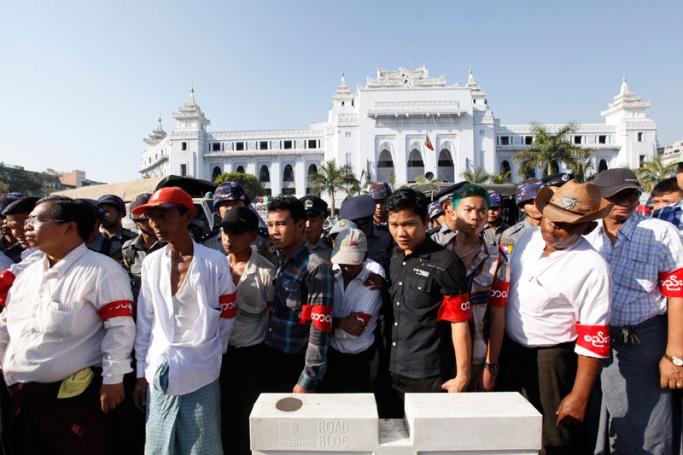Is this the Myanmar regime of old? The scenes in Letpadan and Yangon last week of police brutality against unarmed though agitated student protesters appeared to be a throwback to the dark days of repressive military rule. Foreign governments and rights groups expressed outrage over the baton-wielding police and vigilantes in red-armbands – alarmed by a backsliding on human rights in the crucial election year of a country on the path to democracy – but there were some, largely silent observers, who were not surprised.
Myanmar’s opening to the world during the last four years can be viewed in two ways.
The common perception is of a military regime that drafted a flawed constitution, held a flawed election, won power in a different guise, but is genuine about political, economic and social reform and re-engaging with the world after half a century as a pariah. President U Thein Sein, it can be argued, has done a passable job under difficult circumstances as the acceptable face of reform and engagement. Many Western governments and companies, keen to engage, invest and profit from the considerable opportunities of Asia’s last frontier market, have been quick to shake hands with men who were formerly anathema. This is the façade most want to believe.
Yet there are Myanmar and foreign observers who tend towards a more cautious appraisal and are therefore not surprised by the “backsliding” highlighted by the UN special rapporteur on human rights in Myanmar in a report this week on her second visit to the country in January. These observers are not surprised that problems are emerging in the run-up to the general election due later this year that could be the freest since 1960. These sceptics see the influence of wolves in sheeps clothing who have pretended to embrace a façade of democracy while keeping the levers of power firmly clenched between their jaws. Some might argue that this is not backsliding, it is part of the plan.
What is unclear to these observers is how the government – controlled by the ruling Union Solidarity and Development Party and a cabal of generals – is hoping to retain power in an election widely expected to result in a landslide victory for Daw Aung San Suu Kyi’s National League for Democracy, its fighting peacock flag a conspicuous presence at most big public rallies and demonstrations.
It is the anti-government demonstrations and the reactionary response to them, suggest the sceptics, that help to explain the excessive use of force. Their view is that the government of President U Thein Sein is little worried by domestic and foreign media coverage of police brutality, the shelling of villages in Shan, Kachin and Kayin states, the abysmal plight of the Rohingya, the strikes by factory workers for better pay and conditions, the anger over jailed journalists, or the controversy over divisive and discriminatory laws on religious conversion and marriage. The Nay Pyi Taw government can cast a glance around the neighbourhood and think it is not doing too bad a job. Thailand is in reverse gear, ruled by a military dictatorship. China desperately blocks any flowering of democracy.
The Nay Pyi Taw government knows that despite the cries of foul, Western countries are on board for the ride because they have too much to lose if they pull out, not least the United States, aware of China’s darkening shadow over Asia.
The Union and its security and stability are the keywords of the Nay Pyi Taw government. Beware, warn the sceptics. If any of these watchwords are threatened in the run-up to the general election, the government may well intervene and postpone or even cancel them, a precedent having been set by the abrupt cancellation of the by-elections due to take place last year.
Brace for more unrest as the hot season looms. The bigger the fuss, the more compelling the reason that Nay Pyi Taw can put forward for postponing the election.
The more protests there are involving students and ethnic and religious activists, the greater the risk of democracy being put on hold again, as it was when Ne Win seized power in 1962.
What are you? A sceptic or a believer?
This Article first appeared in the March 19, 2015 edition of Mizzima Weekly.
Mizzima Weekly is available in print in Yangon through Innwa Bookstore and through online subscription at www.mzineplus.com
You are viewing the old site.
Please update your bookmark to https://eng.mizzima.com.
Mizzima Weekly Magazine Issue...
14 December 2023
Spring Revolution Daily News f...
13 December 2023
New UK Burma sanctions welcome...
13 December 2023
Spring Revolution Daily News f...
12 December 2023
Spring Revolution Daily News f...
11 December 2023
Spring Revolution Daily News f...
08 December 2023
Spring Revolution Daily News f...
07 December 2023
Diaspora journalists increasin...
07 December 2023
More than 70,000 IDPs return home after fighting stops in Rakhine












